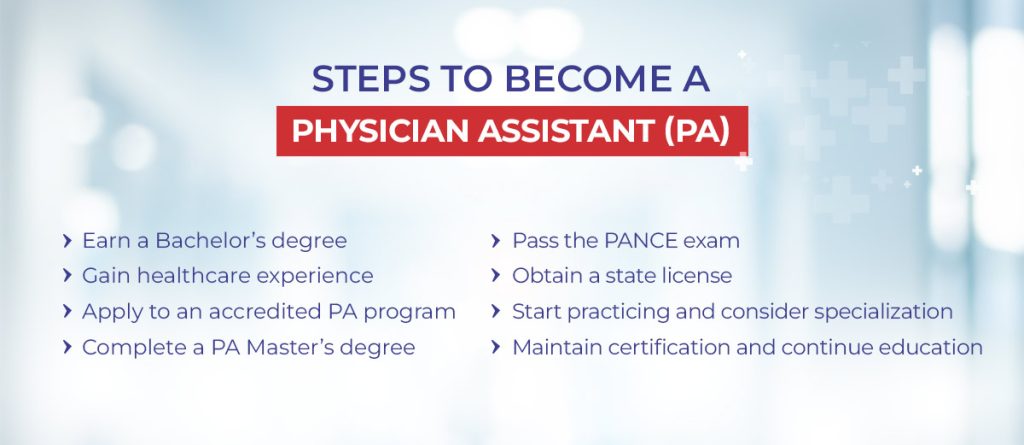Thinking about a career in healthcare but don’t want to spend a decade in medical school? Becoming a Physician Assistant (PA) could be the perfect choice. PAs work closely with doctors, diagnose illnesses, prescribe medications, and assist in surgeries. They play a key role in patient care while enjoying a flexible and rewarding career.
This career offers great pay, job security, and a chance to make a real difference. If you love medicine and want a hands-on role, this might be the right path for you.

Learn how to become a Physician Assistant. Discover the role, training, and benefits. Start your healthcare career with Intuitive Health Services today.
But what exactly do they do, how did the profession started and what is the scope of becoming a PA? Let’s find out.
What is a Physician Assistant?
A Physician Assistant (PA) is a licensed healthcare professional. They work under a doctor’s supervision but perform many of the same tasks. PAs diagnose conditions, prescribe medicine, and even assist in surgeries.
Unlike doctors, PAs don’t need a medical degree. However, they complete intensive training and hands-on experience. This allows them to provide top-quality patient care across different specialties.
Origin of the Physician Assistant (PA) Profession
The Physician Assistant (PA) profession started in the 1960s in the U.S. There was a shortage of doctors, especially in rural areas. To solve this, Dr. Eugene Stead of Duke University created the first PA program in 1965. It trained medical personnel quickly to assist physicians.
Since then, the PA role has grown. Today, thousands of PAs work in hospitals, clinics, and specialty practices. They provide essential healthcare, helping meet the rising demand for medical professionals.
What Does a Physician Assistant Do?
A Physician Assistant plays a vital role in healthcare. They examine patients, diagnose illnesses, and create treatment plans. In many states, they also prescribe medications. Their work ensures timely and effective care for patients. PAs assist doctors during medical procedures and surgeries. They order and interpret tests like blood work, X-rays, and MRIs. These tests help them develop the best treatment approach. They also monitor patient progress and adjust care plans as needed.
Educating patients is also an important part of a PA’s role. They explain conditions, medications, and treatments in easy-to-understand terms. PAs also provide guidance on lifestyle changes, like diet and exercise, to help patients better manage their health.
In emergency rooms, they treat wounds, stabilize patients, and handle urgent cases. In primary care, they perform check-ups and manage chronic conditions. While their specific duties vary by specialty, PAs always work closely with doctors and healthcare teams to deliver the best care.
PAs improve healthcare accessibility and efficiency. They reduce wait times, ease the workload of doctors, and enhance patient care. Their expertise makes them an essential part of the medical field.
Specializations for Physician Assistants
Physician Assistants can work in various medical fields. Specializing helps them gain expertise and provide better patient care. Below are some common PA specialties:
1. Primary Care
In primary care, PAs handle general health concerns. They perform check-ups, diagnose illnesses, and manage chronic conditions. Their work ensures patients receive ongoing medical attention. Many PAs in this field build strong relationships with their patients.
2. Emergency Medicine
Emergency medicine is fast-paced and demanding. PAs in this field treat injuries, perform life-saving procedures, and stabilize patients. They must think quickly and act decisively. Their ability to handle high-pressure situations makes them essential in hospitals.
3. Surgery
Surgical PAs assist in operating rooms. They help with procedures, close incisions, and provide post-surgical care. Their role is critical to a smooth surgery process. They also educate patients on recovery and aftercare.
4. Orthopedics
In orthopedics, PAs treat bone and joint conditions. They assist with fractures, dislocations, and sports injuries. Many perform joint injections and help with rehabilitation plans. Their expertise improves mobility and reduces pain for patients.
5. Dermatology
Dermatology PAs focus on skin, hair, and nail conditions. They diagnose and treat acne, eczema, and skin cancers. Many perform cosmetic procedures like laser treatments and Botox. Their work helps patients improve both skin health and confidence.
6. Cardiology
These PAs assist in diagnosing and treating heart conditions. They monitor heart disease, conduct stress tests, and manage medications. Their work supports early detection and treatment, improving patient outcomes.
7. Psychiatry
These professionals focus on mental health. They diagnose and treat depression, anxiety, and other disorders. Many provide therapy, prescribe medications, and offer crisis intervention. Their role helps patients achieve better emotional well-being.
PAs can switch specializations without returning to medical school. This flexibility allows them to explore different fields. Regardless of their specialty, all PAs play a key role in patient care.
How Long Does It Take to Become a Physician Assistant?
Becoming a PA takes six to seven years on average. Here’s the breakdown:
- Bachelor’s Degree (4 years) – Most PAs major in biology, health sciences, or a related field
- Healthcare Experience (Varies) – Many PA programs require hands-on experience in healthcare. This includes working as a paramedic, medical assistant, or nurse
- PA Program (2–3 years) – A Master’s degree in Physician Assistant Studies is required. Programs include classroom learning and clinical rotations
- Certification & Licensing – After graduation, candidates must pass the Physician Assistant National Certifying Exam (PANCE)
In total, becoming a PA takes around six to eight years. Those who take a gap year for experience may take longer. However, the effort pays off with a rewarding and in-demand career.
Skills Needed to Become a Physician Assistant
To succeed as a PA, you need both medical knowledge and soft skills. Key skills include:
- Time Management
- Attention to Detail
- Medical Expertise
- Critical Thinking
- Communication
- Empathy
Strong problem-solving and teamwork skills are also essential. PAs work in fast-paced medical settings, that’s why these abilities are crucial for them to succeed.
Steps to Become a Physician Assistant
Becoming a Physician Assistant (PA) demands commitment and a well-organized training process. It includes obtaining a degree, gaining hands-on experience, and successfully completing a PA program. Here’s the process you can follow if you aspire to become a PA.

- Earn a Bachelor’s Degree
The first step is earning a bachelor’s degree, typically in a science-related field. Most aspiring PAs major in biology, health sciences, or kinesiology. During this time, students study subjects like anatomy, microbiology, chemistry, and physiology. Some PA programs may also require courses in psychology and statistics. A strong GPA is crucial, as PA schools have competitive admissions processes.
- Gain Healthcare Experience
Most PA programs require hands-on patient care experience. Many applicants work as medical assistants, EMTs, or nursing assistants before applying. This experience helps build essential clinical skills and strengthens applications. Some schools mandate at least 1,000 hours of healthcare experience, while others prefer candidates with over 4,000 hours. The more experience you have, the better your chances of being accepted into a program.
- Apply to an Accredited PA Program
Once the required experience is gained, the next step is applying to a PA master’s program. The application process is competitive and often done through CASPA (Centralized Application Service for Physician Assistants). A strong GPA, letters of recommendation, and a compelling personal statement are crucial. Some programs require applicants to take the GRE or PA-CAT. A well-prepared application increases the likelihood of acceptance into a top-tier program.
- Complete a PA Master’s Degree
PA programs usually take two to three years to complete. They combine classroom learning with hands-on clinical rotations. The first phase covers essential subjects like medical sciences, pharmacology, pathology, and patient assessment.
The second phase focuses on clinical training in areas like emergency medicine, internal medicine, and surgery. These rotations give students a chance to apply their knowledge in real healthcare settings. By the end of the program, students are fully prepared to take the certification exam.
- Pass the PANCE Exam
After finishing a PA program, graduates must pass the Physician Assistant National Certifying Exam (PANCE). This challenging exam tests your medical knowledge and problem-solving abilities. Many students dedicate several months to preparing, ensuring they’re fully ready. Passing the PANCE is crucial as it’s the key to getting your state license and starting your career as a certified Physician Assistant.
- Obtain a State License
Each state has its own licensing requirements. Most require you to submit your PANCE scores, complete background checks, and pay a licensing fee. Some states may also ask for additional exams or paperwork. Once you’re licensed, you can begin practicing as a Physician Assistant in healthcare settings.
- Start Practicing and Consider Specialization
After obtaining a license, PAs can work in hospitals, clinics, or private practices. Some choose to specialize in areas such as surgery, dermatology, or cardiology. Specializing often requires additional training, certifications, or fellowships.
- Maintain Certification and Continue Education
To stay certified, PAs must complete 100 hours of continuing medical education (CME) every two years. They also need to pass the Physician Assistant National Recertifying Exam (PANRE) every ten years. Continuous learning ensures PAs stay updated with medical advancements and provide the best possible care to patients.
Why Choose a Career as a Physician Assistant?
A career as a Physician Assistant (PA) offers many benefits. It’s a fulfilling and growing field with great opportunities. Here’s why you should consider becoming a PA:
- High Job Demand: PA is a highly demanded field. According to BLS, the employment of physician assistants is projected to grow 28 percent from 2023 to 2033. As healthcare expands, more PAs will be needed to provide care.
- Work-Life Balance: PAs enjoy a better work-life balance as compared to other health department jobs. Many work regular hours with fewer night shifts or on-call duties. This gives them more personal time and flexibility.
- Career Flexibility: One of the best perks of being a PA is working in many specialties, from surgery to dermatology. They can also switch fields during their careers without needing to retrain.
- Competitive Salary: PAs earn a good salary. The median annual wage is $130,020. With experience and specialization, this figure can increase.
- Direct Patient Impact: They have a direct impact on patient care. They diagnose, treat, and build strong relationships with patients, improving outcomes.
- Job Satisfaction: Many PAs find their work fulfilling. Helping patients and working in a supportive team environment brings high job satisfaction.
- Continuous Learning: PAs are always learning. They stay updated on medical advancements through ongoing education and training.
A career as a Physician Assistant offers stability, a competitive salary, and the opportunity to directly impact patient care. With growing demand and room for professional growth, it’s a fulfilling career choice.
If you’re looking for flexibility in your career, partnering with trusted medical staffing solutions like Intuitive Health Services can be beneficial. We connect healthcare professionals with opportunities that align with both your career goals and personal needs.
Contact today to learn more.
Frequently Asked Questions (FAQs)
- What’s the difference between a PA and a doctor?
A PA works under a doctor’s supervision but performs many of the same duties. PAs require less schooling than doctors. - Can a Physician Assistant perform surgery?
PAs assist in surgery but don’t perform major procedures independently. - Is the PA profession growing?
Yes. The job market for PAs is expected to grow by 31 percent over the next decade. - Can PAs change specialties?
Absolutely! Unlike doctors, PAs can switch specialties without extra schooling. - Do PAs need continuing education?
Yes. PAs must complete ongoing training to maintain their license.

